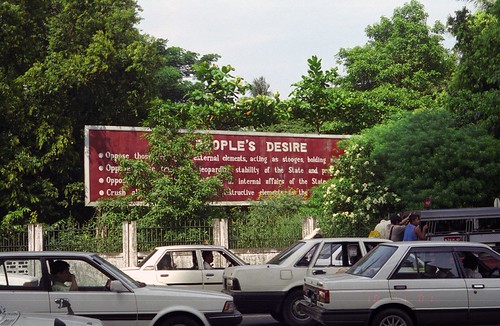I took a break from the grueling studying to post this. In my breaks, I’ve been reading The River of Footsteps: Histories of Burma by Thant Myint-U. I’ll probably write up my reactions and thoughts on the book after I’ve finished reading it.
Anyway, the following is a small collection of messages (mostly from Flickr and one of my own) that are supposed to appeal to the masses in Burma.

“The Tatmadaw shall never betray national causes” billboard in Kentung, Shan State. Photo by immu.

“Love your motherland, respect the law” billboard in Nyaungshwe, Shan State. By michaelnewport.

“Tatmadaw and the people, cooperate, and crush all those harming the Union” banner in Mandalay. By me.

“People’s desire” billboard in Rangoon. By markku_a.

“People’s desire” billboard in Mandalay. By rmnl.
According to the government, the people’s desire(s) are:
- Oppose those relying on external elements, acting as stooges, holding negative views
- Oppose those trying to jeopardize stability of the State and progress of the nation
- Oppose foreign nations interfering in internal affairs of the State.
- Crush all internal and external destructive elements as the common enemy.
Or in Burmese (I think it only works with Myanmar1, MyMyanmar, and Padauk fonts),
အစုိးရရဲ့ပ္ရည္သူ့သဘောထား
- ပ္ရည္ပအားကုိး ပုဆိန္ရုိး အဆုိးမ္ရင္ဝာဒီမ္ယားအား ဆန့္က္ယင္က္ရ။
- နုိင္ငံတော္ တည္င္ရိမ္*အေးခ္ယမ္းရေးန္ဟင့္ နုိင္ငံတော္တုိးတက္ရေးကုိ န္ဟောင့္ယ္ဟက္ဖ္ယက္ဆီးသူမ္ယားအားဆန့္က္ယင္က္ရ။
- နုိင္ငံတော္၏ ပ္ရည္တ္ဝင္းရေးကုိ ဝင္ရောက္စ္ဝက္ဖက္ န္ဟောင့္ယ္ဟက္သော ပ္ရည္ပနုိင္ငံမ္ယားအား ဆန့္က္ယင္က္ရ။
- ပ္ရည္တ္ဝင္းပ္ရည္ပ အဖ္ယက္သမားမ္ယားအား ဘုံရန္သူအဖ္ရစ္ သတ္မ္ဟတ္ခ္ယေမ္ဟုန္းက္ရ။
*‘Nyein’ as in ‘calm’. For some reason, that word doesn’t appear correctly.


I’ve noticed how pervasive these “desire(s)” are in online and print publications in Burma. From what I’ve heard, not even an Internet chatroom can get away without posting the “objectives”, “desire(s)” and “national causes” of the country. No publication would be complete or legal without this stamp of approval (namely the dictates of the government).
What is really the point when ordinary Burmese overlook and habituate themselves to the blaring posters, banners, and notices? To reinforce the notion that the government is inescapable and omnipresent.
I’m sure these signs also appear in Burmese, but it’s still interesting that some are only in English. Burmese is still the most common common language, is it not? How many people in Nyaungshwe or Kengtung do you think speak English well enough to read those signs the first time they see them?
Of course, that’s probably a silly point – I imagine growing up with these ubiquitous signs means that they learn the English that’s on them quite well. But still, given that most English signs in other Asian countries are specifically for foreigners, I can’t help wondering if there is some similar intent behind the junta’s English signs as well.
I like the view of Burma (Myanmar) but I am afraid of them, how much they advertise on televison or newspaper. i know it real them the adverties. if people live in the town and city, they don’t know what going on for the people near the border.
I wonder if they give people more opportunity to go and to word, and provide the job, help poor people, provide medical care.
faithfully
MJ
Editor: That’s true; most locals wouldn’t know English. And besides, I think it’s the government’s dogmatic agenda of using the Burmese language as the “official” one in areas where Shan and other minority languages are used.
I travelled to Burma in late 1999. I saw these messages displayed in various ways quite frequently & I felt that they were definitely targeted at visitors instead of citizens. The ruling government is chronically worried about foreigners entering the country, viewing the appalling neglect, witnessing examples of repression & perhaps developing ideas of “activisim” while in Burma. So, these messages are there for you to intimidate & warn you of the consequences if you do not behave during your stay. As an example: I flew from Yangon to Bagan on a Burmese airline….in the pocket of the seat in front of me was one of those typical airline magazines one always finds during a flight….Opening the magazine on the first page was a delightful full-page message from the junta letting you know that they will crush any opposition to them & welcome to their country.